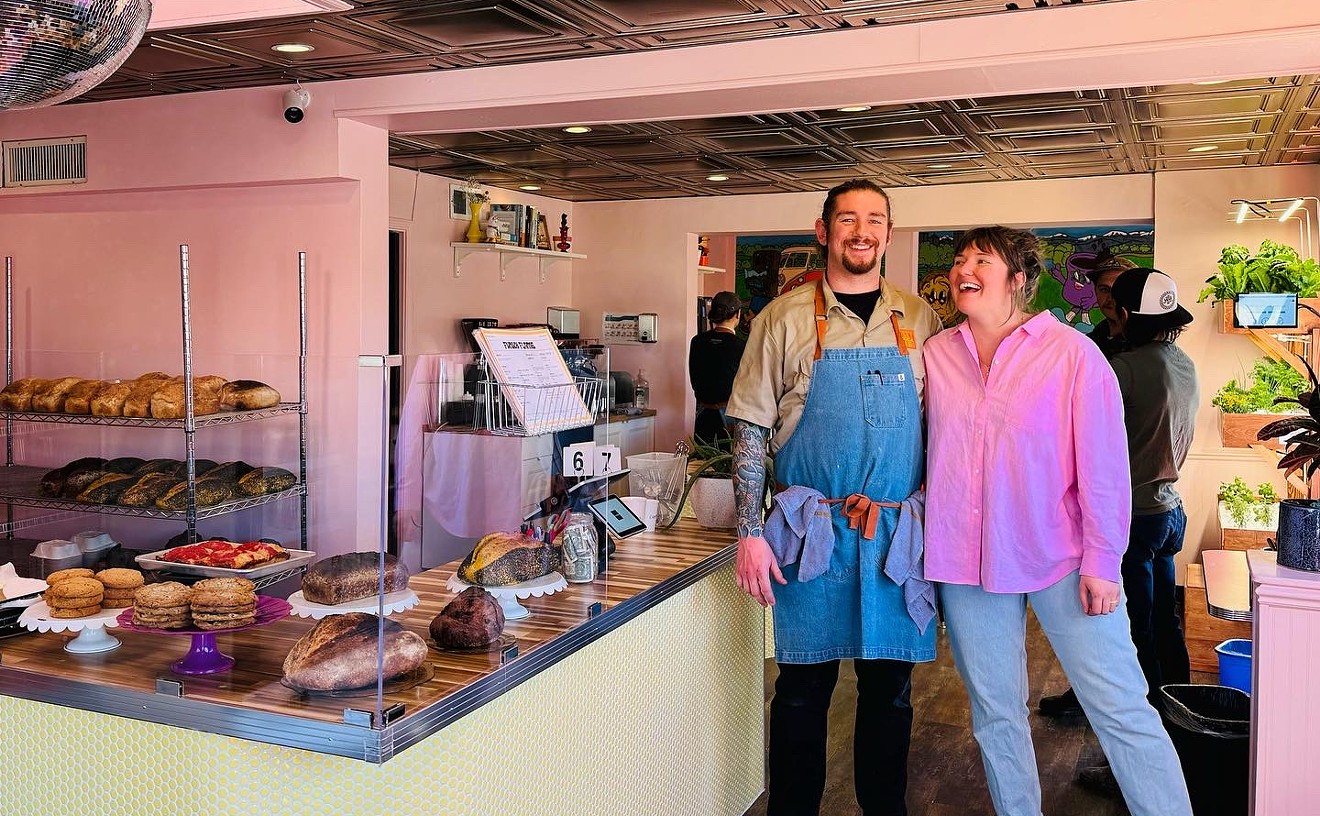"I find the use of this word offensive," Iwamoto says. "Many young Japanese-Americans may not be aware of its connotation. However, the word used to be a strong insult and still lives painfully in the memories of many."
For Brian Hashimoto, the word is akin to other derogatory terms used in this country. "Hey, what if we called a restaurant by the N-word?" he asks. "I'll bet that wouldn't go over so easily."
But Dennis Page, one of Hapa's owners, says the word has a very positive meaning. A derivative of the Hawaiian word hapahaole, which literally translates to "half spiritless" or "half lifeless," hapa was originally used by Hawaiians to refer to anyone who was biracial. With the advent of World War II, though, the word was applied almost exclusively to Japanese. "I agree, at one point the term was negative," says Page, who is half-Japanese. "But since then, people of my generation have tried to celebrate our cross-culture lives, and to say that now people who are half Japanese and half American shouldn't go ahead and use the term to bring acceptance would be to miss the point. The bottom line is, I am hapa, and most of the people I have working for me are a result of hapa."
Page, whose restaurant is one of 27 Japanese eateries across the United States that use the word in their names, was a member of the Hapa Issues Forum, a nonprofit group in San Francisco, when he attended the University of California at Berkeley. "The group formed to address things that Asian mixed-heritage Pacific Islanders face," Page explains. "I have family on one side who were in internment camps, and they have all applauded my attempt to make hapa a good influence. I understand that older people who went through the war and still have bad feelings about the term might be upset, but I can either use it to be a positive force in the world or cower under history. I choose to do the former."
Iwamoto isn't convinced that's a good idea. "Now that this restaurant has opened, the word and the insult it carries with it has resurfaced," he says. "The only other meaning for the word happa in Japanese is leaf, which is the slang term for marijuana. Maybe the owner is trying to target a younger crowd."
But, hey, regardless of age, shouldn't everyone experience a multiple orgasm at Hapa at least once?
Another chapter ends: Elsewhere in Cherry Creek, something's up atop the Tattered Cover. After recently losing general manager Donald Rossa and chef Jason Palmer to Dazzle (930 Lincoln Street), the Fourth Story (2955 East First Avenue) just lost sommelier and beverage director Mark Sandusky to Barolo Grill (3030 East Sixth Avenue). And that's a tough one, since Sandusky had been responsible for making the Fourth Story's wine list one of the best in the city, a roster so well rounded and fun that I'd given it a Best of Denver award for several years running.
In addition, the Fourth Story just received a "kick in the butt" award from 5280 magazine in its October/November restaurant edition.
Two former Fourth Story employees and a current one, all asking that their identities be kept anonymous, point to enormous "political" and "personality" problems at the restaurant. "Don't even try to say that I'm saying it comes from Joyce Meskis," one says, speaking of the Tattered Cover's legendary owner. "It's in the restaurant itself, and even though I think she is one of the most incredible businesspeople ever, the people in the restaurant are not from her mold, unfortunately."
Adds another, "It takes a long time for things to change there -- like months."
But in this increasingly tough economic climate, restaurants may not have the luxury of taking too long to make fixes.
Charity begins at restaurants: Months ago, this very newspaper chose Thursday, October 11, for its Menu of Menus Affair at Colorado's Ocean Journey (700 Water Street), a spread of great food from twenty local restaurants for some very good causes.In the intervening weeks, of course, the horrors of September 11 struck, and the Colorado Restaurant Association chose to mark the one-month anniversary on October 11 with Dine Out to Help Out, during which numerous eateries will donate a minimum of 11 percent of their tabs to relief efforts.
If you hurry -- this issue is dated October 11 -- there's still time to do good and eat well at both events. The Menu of Menus Affair (which benefits Food Bank of the Rockies, Ocean Journey and the International Association of Fire Fighters) runs from 7 to 10 p.m., and a $35 ticket nets you both a free feed and entertainment at the fish palace. For more information and a list of participating restaurants, log on to westword.com.
Dine Out to Help Out runs all day; for a list of participating restaurants, log on to coloradorestaurant.com. Don't expect to find a plethora of Denver eateries, though: Of the 306 Colorado eateries listed, 136 are out of town, from Colorado Springs to Durango and Fort Collins to Aspen. With nearly 3,500 restaurants in the metro area alone, we're not exactly making a huge statement here -- although some restaurants, such as The Fort, which keeps sending out press releases touting its 11 percent donation, would like you to think so. But all of the participating Vail restaurants are donating 75 percent, and many chains are giving 100 percent. (Go to restaurant.org for the National Restaurant Association's list by state.) Sandwiched between such heavy-hitters as Del Frisco's Double Eagle Steakhouse and its sibling steakhouse, Sullivan's, I found the little Moose Hill Cantina (955 South Kipling Parkway in Lakewood), which serves really good Mexican, Greek and American specialties.
For once, you won't have to feel guilty if you eat your way through the day, satisfying both body and soul in the process.










